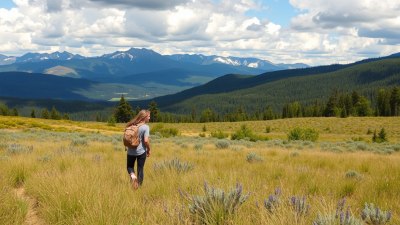Why Every Local Says “It’s Never Usually This Hot/Cold” (And Why It Always Is)
Explore the psychology behind locals' weather perceptions and why they often believe it’s unusually hot or cold.

Image by alikaobraz on Freepik
Weather has a profound impact on our daily lives, influencing everything from our moods to our activities. Whenever temperatures swing to extremes—whether unusually hot or cold—locals often exclaim, “It’s never usually this hot/ cold!” But is this sentiment universal? Why do people feel that the weather patterns they experience are outside the norm? In this article, we delve into the psychology and statistics behind this common expression, examining the reasons why locals frequently believe their weather experiences are anomalies.
The Psychology of Perception
To understand why locals perceive current weather as unusual, we must first look at the psychology of perception. Humans are naturally inclined to notice extremes. Whether it's the hottest day of the year or a surprising cold front, we have a tendency to remember the standout days while forgetting the more moderate ones. Cognitive biases, including the availability heuristic, suggest that individuals assess the probability of events based on how easily examples come to mind. Consequently, if someone experiences an exceptionally hot day, it ranks higher in their memory than typical weather patterns.
Confirmation Bias
Confirmation bias plays a key role in how we interpret weather. This psychological phenomenon occurs when people seek out information that confirms their pre-existing beliefs. If a local holds the belief that their climate is generally moderate, any notable deviations—heat waves or cold snaps—will stand out more distinctly. They actively remember these events, often quoting statistics or anecdotes to back their claim, thus reinforcing their views on local climate extremes.
Local Climate Variability
Additionally, local climate variability contributes to this perception. Residents frequently rely on their own experiences to gauge normalcy. For example, those living in a region that typically has temperate weather might be unaccustomed to intense heatwaves or colder winters, leading them to label unusual weather as abnormal. This leads to a disconnect between scientific data and anecdotal experiences, as residents may lack awareness of long-term climate trends.
Historical Context and Climate Change
Historically, many regions have undergone significant climate changes over the decades and centuries. Increases in global temperatures are a widely accepted fact due to climate change. Therefore, residents may notice that phenomena perceived as uncommon are becoming more frequent, compounding their feelings of disbelief when unusual weather strikes. A hot summer, for example, might be remembered as part of a collective experience of heat, which locals associate with being out of the ordinary, although it may align with recent climate trends.
Media and Social Influence
Social media also plays a major role in shaping perceptions of weather patterns. Platforms like Twitter, Facebook, and Instagram amplify individuals' weather-related thoughts. When local influencers or media outlets report extreme temperatures, it tends to spark conversations that reinforce the notion that current conditions are unusual. Furthermore, memes and viral posts about extreme weather often circulate, fueling the idea that locals are experiencing something completely out of the norm. This social reinforcement creates a shared narrative that further solidifies the belief among residents.
The Role of Seasonal Expectations
Seasonal expectations also influence perceptions of normalcy. When temperatures deviate significantly from seasonal norms, residents often feel unsettled. For instance, a typically freezing winter that unexpectedly delivers warm days may trigger comments about uncharacteristic warmth. These expectations are often based on historical weather patterns within specific months or seasons, steering residents toward perceiving variance as noteworthy or alarming.
Environmental Impact and Adaptation
As climate change continues to reshape weather patterns, locals often battle with both environmental impacts and personal adaptation. Communities accustomed to a certain climate may find it increasingly challenging to navigate extremes. Heatwaves can stress water resources, while unusual cold can lead to infrastructure problems. This reality not only validates the locals’ vocalizations about weather anomalies but also sheds light on the difficulties of adapting to a rapidly changing environment.
Looking at the Data
To further unravel why locals feel the weather is unusual, consider a comparison of short-term fluctuating patterns against long-term climate trends. National meteorological organizations often report these shifts through data analysis. For instance, the National Oceanic and Atmospheric Administration (NOAA) tracks climate statistics and notes trends that demonstrate variations occurring over decades. While a specific weather event might appear unusual on a personal level, data may show that such phenomena occur more frequently than residents realize.
Personal Anecdotes and Less Frequent Events
Additionally, personal anecdotes and isolated extreme weather events can lead locals to collectively conclude that they are experiencing unique weather. If several residents report stories of past extreme weather from bygone years, it bolsters the perception that they are living in a time when unusual weather occurs. These narratives can be powerful, even if they are based on isolated incidents, further influencing misunderstanding about the broader context of climate variability.
Embracing Weather Diversity
Ultimately, the phrase “It’s never usually this hot/cold” highlights how human psychology shapes our understanding of weather patterns. By recognizing the influencing factors that underpin this statement, we can better appreciate the complexities of weather perception. Rather than merely dismissing extreme weather claims, we should acknowledge their roots within cognitive biases, historical context, and changing climates. Through education and awareness, locals can learn to adapt to evolving weather patterns, fostering a community open to discussing the varieties and extremes of nature itself.











